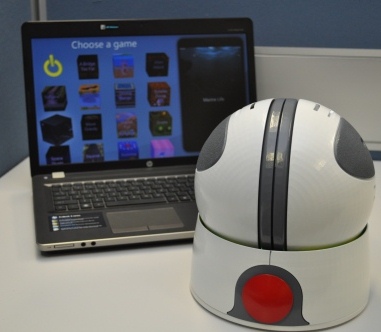Local gaming orb turns globe-trotter
 An odd looking but very useful Australian invention is touring the world.
An odd looking but very useful Australian invention is touring the world.
‘OrbIT’, Flinders University’s award-winning accessible gaming system and controller, has backed up from trips to Italy and the USA last year with a feature spot at the 3rd European Conference on Design4Health this week at Sheffield Hallam University.
Co-inventor and Flinders Associate Professor in Product Design, Sandy Walker, will present the system at the conference, discussing the cross-institutional approach and design principles that were used to develop the novel gaming system.
“OrbIT is unique because it brought together three different institutions – Flinders University, the University of South Australia, and the Women’s and Children’s Hospital – from multiple disciplines and specialities, to deliver a product that is widely enjoyed and acclaimed,” said Associate Professor Walker.
“It’s a great opportunity to share some of the learnings that have been captured during the development of OrbIT and is extremely satisfying to see a product developed from within the University system recognised amongst such high calibre products.”
The gaming system, developed by a team of cross-institutional researchers and designers, led by Flinders biomedical engineer David Hobbs, was designed specifically for people with limited hand function, such as children with cerebral palsy.
Depending on their diagnosis, most children with cerebral palsy will undergo extensive rehabilitation throughout their lifetime, with many experiencing difficulty in detecting and sensing touch with their hands.
Wanting to make a difference, Mr Hobbs, set about using his PhD to develop a novel and accessible computer gaming system that would allow people with limited hand control and/or coordination to play computer games.
“Being selected as an exhibitor in this premier design in health conference is significant and will mean the system is on show to not only design delegates but also the general public who will visit the exhibition,” said Mr Hobbs.
Associate Professor Walker will also present and exhibit the design and development process for a medical task training device, which is now being manufactured in Germany and sold internationally, and will take part in the Design4Health 24hr Design Challenge focussing on Parkinson’s Disease.
Upon returning to Australia, OrbIT will not be idle for long.
David Hobbs has been invited to present on the system in Singapore next month at the Serious Games Conference 2015 in August.








 Print
Print